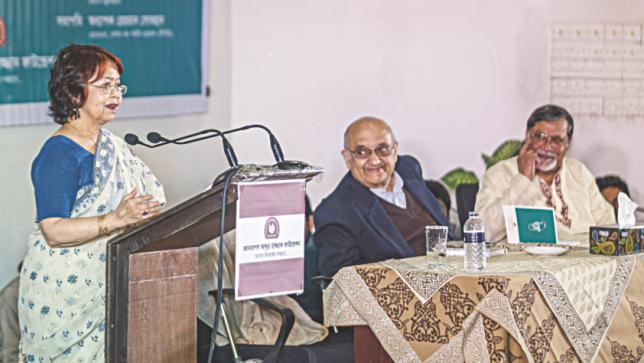Published in The Daily Star on Sunday, 28 January 2018

Staff Correspondent
Growing influence of money and criminalisation has marred the glorious tradition of Bangladesh’s movement and ideology-based politics, said an eminent scholar of politics, Dr Rounaq Jahan, yesterday.
Also, the student movements that played key roles in the country’s political and cultural activism in the 1960s and 70s, and ignited national movements witnessed a decline in ideologies, she said.
“The nexus between politicians, businessmen, mastaans [thugs] and the law enforcement agencies has become embedded in the political system,” said Prof Jahan while delivering Gyantapas Abdur Razzaq Distinguished Lecture-4 on “Political Parties: Movements, Elections and Democracy in Bangladesh”.
As a result, the political parties’ role of strengthening democracy has weakened, she said at the programme organised by Gyantapas Abdur Razzaq Foundation in the Muzaffar Ahmed Chowdhury auditorium of Dhaka University.
Dr Rounaq Jahan, who is globally recognised for her scholarly research, explained the evolution of the country’s political parties, the trends in last four decades and the ways forward.
During the first three years of civilian rule since 1972, the country moved from a one party dominance to a single party system. And, state-sponsored political parties built on a patronage system emerged during the next 15 years of military rule.
“Ideological principles played a little role in their [BNP and Jatiya Party] formation…,” Prof Jahan said.
Thus, a new breed of political actors emerged, who were catapulted to leadership positions without any apprenticeship in party politics, she said.
“Unfortunately, this tradition of using state patronage for party building continued even during the democratic era after 1991,” said Jahan.
The ruling parties continued to use the civil administration, law enforcement agencies and intelligence services to promote partisan interests. By controlling the state authorities, the party in power not only rewards its supporters, but also punishes the opponents, she added.
Dr Jahan said the student and youth fronts of both the parties are presumably dominated by thugs, who frequently turn campuses of various colleges and universities into a battlefield.
Many of them have become party high-ups in various constituencies and continue their violent and criminal activities, she said. They also use their immunity from law enforcers to extort businesses and construction firms to further their individual wealth, she added.
Each of the two major parties, in the current electoral system, generally received near equal shares of popular vote. However, when it comes to seat share in the parliament, there may be a disproportionate difference.
The party coming to power with a two-thirds majority can easily amend the constitution, which is a serious matter. But it needs to be amended with a social consensus, she said.
The two major political parties — AL and BNP — also formed electoral alliances with the BNP siding with some of the religion-based parties, while the Awami League with the leftist ones.
“This alliance further hardened an Islamist/rightist vs secularist/leftist political divide in the country,” she said.
Prof Rehman Sobhan, who chaired the session, said consciousness of a generation determines the political process of a country.
He called upon all to act in ways that can help restore the spirit of the Liberation War that was based on democracy and equality.
Gyantapas Abdur Razzaq Foundation Director General Dr Ahrar Ahmad delivered the welcome address and Jahangirnagar University Prof Al Masud Hasanuzzaman introduced the main speaker.

